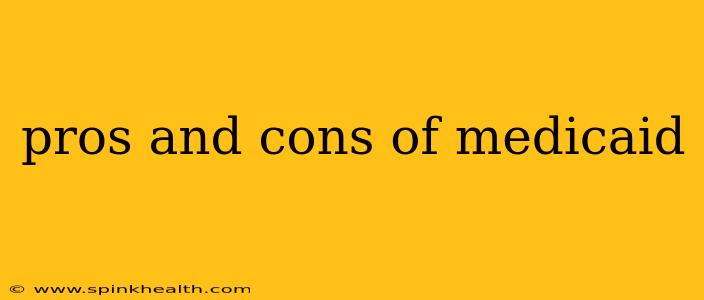Medicaid: A Balancing Act of Benefits and Challenges
Medicaid, a joint federal and state government program, provides healthcare coverage to millions of low-income Americans. It's a vital safety net, but like any large-scale social program, it comes with its own set of advantages and disadvantages. Let's delve into the complex landscape of Medicaid, exploring both its strengths and weaknesses.
Imagine Sarah, a single mother working a minimum wage job. Unexpected medical bills from her child's asthma could easily cripple her finances. Medicaid steps in, providing essential healthcare coverage, preventing a catastrophic financial burden. This is the heart of Medicaid's benefit – ensuring access to healthcare for those who need it most.
The Pros of Medicaid:
-
Access to Healthcare: This is arguably the most significant advantage. Medicaid provides crucial access to healthcare services, including doctor visits, hospital stays, prescription drugs, and preventive care, for individuals and families who otherwise couldn't afford it. This access leads to better health outcomes and reduces the likelihood of preventable hospitalizations.
-
Improved Health Outcomes: Studies consistently demonstrate that Medicaid coverage improves health outcomes. Individuals with Medicaid are more likely to receive preventative care, leading to early detection and treatment of diseases, resulting in better overall health and reduced mortality rates. This is particularly impactful for children, whose access to regular checkups and vaccinations dramatically improves their long-term health.
-
Economic Benefits: While Medicaid requires significant government investment, it also generates economic benefits. By providing healthcare coverage, it reduces the burden on emergency rooms and hospitals, which often absorb the costs of treating uninsured patients. Furthermore, healthier individuals are more productive members of the workforce.
-
Support for Vulnerable Populations: Medicaid is a crucial lifeline for many vulnerable populations, including children, pregnant women, seniors, and people with disabilities. It ensures they receive the necessary healthcare services, leading to improved quality of life and reduced health disparities.
The Cons of Medicaid:
-
High Costs: Medicaid is a costly program, placing a considerable financial burden on federal and state budgets. This cost is a significant point of contention in policy debates, leading to ongoing discussions about program funding and eligibility requirements.
-
Administrative Complexity: The administrative complexities of Medicaid can be significant. Navigating the eligibility requirements and managing the program's various components can be challenging for both beneficiaries and administrators. This complexity can sometimes lead to delays in receiving care or difficulties accessing necessary services.
-
Provider Shortages: In some areas, particularly rural areas, there can be shortages of healthcare providers willing to accept Medicaid patients. This is often due to lower Medicaid reimbursement rates compared to private insurance, making it challenging for providers to remain financially viable.
-
Varying Quality of Care: The quality of care provided through Medicaid can vary depending on the state and the specific provider. While Medicaid aims to ensure access to quality care, the variability in provider networks and reimbursement rates can impact the overall quality of services received.
Frequently Asked Questions:
What are the eligibility requirements for Medicaid?
Eligibility requirements for Medicaid vary by state. Generally, they are based on income and assets, with specific rules for families with children, pregnant women, seniors, and people with disabilities. It's crucial to check your state's specific guidelines to determine eligibility.
How do I apply for Medicaid?
The application process varies by state. You can usually apply online through your state's Medicaid agency website or by contacting them directly.
What services does Medicaid cover?
Medicaid covers a wide range of healthcare services, including doctor visits, hospital stays, prescription drugs, mental healthcare, substance abuse treatment, and preventative care. The specific services covered may vary by state.
Is Medicaid the same as Medicare?
No, Medicaid and Medicare are distinct programs. Medicaid provides healthcare coverage to low-income individuals and families, while Medicare is a federal health insurance program for people age 65 and older and certain younger people with disabilities.
Medicaid’s impact is multifaceted and far-reaching. While it addresses critical healthcare needs for millions, its challenges regarding cost and administration remain persistent. The ongoing debate about Medicaid reflects the complexity of balancing the urgent need for accessible healthcare with the fiscal realities of funding a large-scale social program. Understanding both the pros and cons is crucial for informed discussions about the future of this vital safety net.

